IN LIGHT of increasing regulatory demands globally, labelling today is a highly intricate process that is even more vital to products than ever before. Food and beverage industry players are particularly concerned about the costs of materials and are keen to optimise their investment while increasing brand recognition. With 45 years of experience in the labelling industry and over 5,000 machines installed worldwide, Sidel is one of the leading players in the market, providing the expertise to meet all labelling needs.
Artem Krukov at Sidel talks about trends in labelling and how a greater focus on sustainability and flexibility is changing the way labels are created and applied.
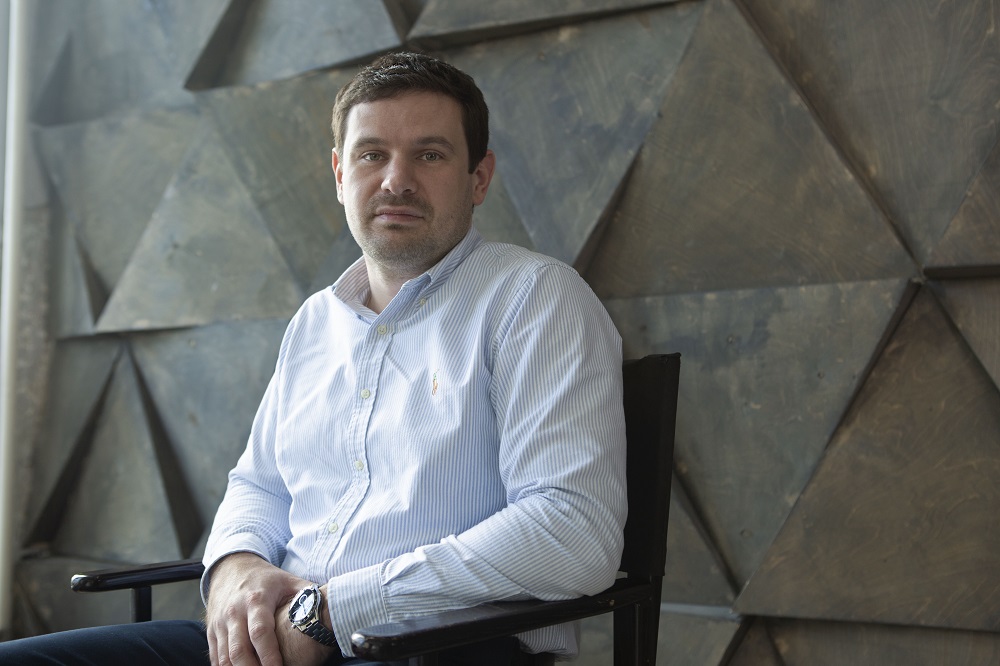
Artem Krukov, Labelling Business Development Director at Sidel
What are the most important challenges in labelling for the beverage industry?
Similar to the manufacturing industry as a whole, beverage producers are searching for greater efficiency and lower total cost of ownership (TCO) for their labelling equipment. There is also a significant focus on sustainability. The label is one of the main interfaces for communication with the consumer. Companies are changing their labels constantly to respond to fast-changing consumer preferences.
How is labelling becoming more sustainable?
It is our goal to help customers cut costs on everything from material consumption to maintenance costs. By reducing label thicknesses and surface areas, customers can cut costs and improve the carbon footprint of label production and the labelling process. Label producers are working to ensure that labels do not affect PET recycling.
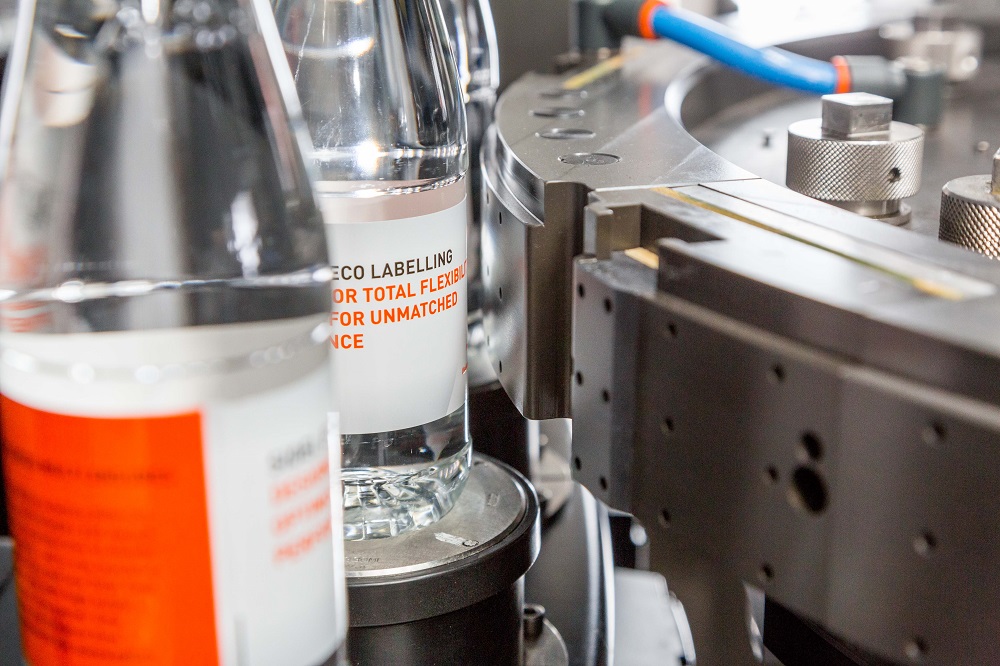
Another important trend is the conversion of labels from shrink sleeves to BOPP labels (plastic roll-fed labels for wraparound application). This is a very important step in bottle labelling, since containers labelled with shrink sleeves are difficult to recycle. Hence, the shift to BOPP labels not only provides recycling capabilities, but also helps companies reduce their carbon footprint even further.
What do you mean by that?
Historically, labels have caused issues with PET recycling to food-grade standard because the label or the glue has affected the recycling process. Today there are several initiatives that can minimise this impact, namely label surface/size reduction, wash-off glue development and glue application minimisation.
All drinks manufacturers focus a lot on glue characteristics. What is the reason for this?
We can observe this tendency via two trends. First of all, customers around the world are eager to reduce the amount of glue for three reasons: 1) more glue equals higher costs; 2) less glue usage positively impacts machine cleanliness, which leads to higher efficiency; and 3) glue affects the recycling process. Most importantly, customers want to address all of these factors without sacrificing product quality. The second trend can be seen only in some countries: customers want to increase glue distribution to make label application more solid and stable.
Sidel has developed a unique solution that fulfils both requirements, namely by leveraging the BOPP solution, we have developed a laser-engraved glue roller (a standard scope for the roll-fed machine portfolio). Thus, we can have better control of glue distribution and repeatability. As a result, the label can still maintain its optimal quality even with less glue. At the same time, we can manage higher glue quantity as well, and it will be distributed more efficiently over the entire glue strip surface.
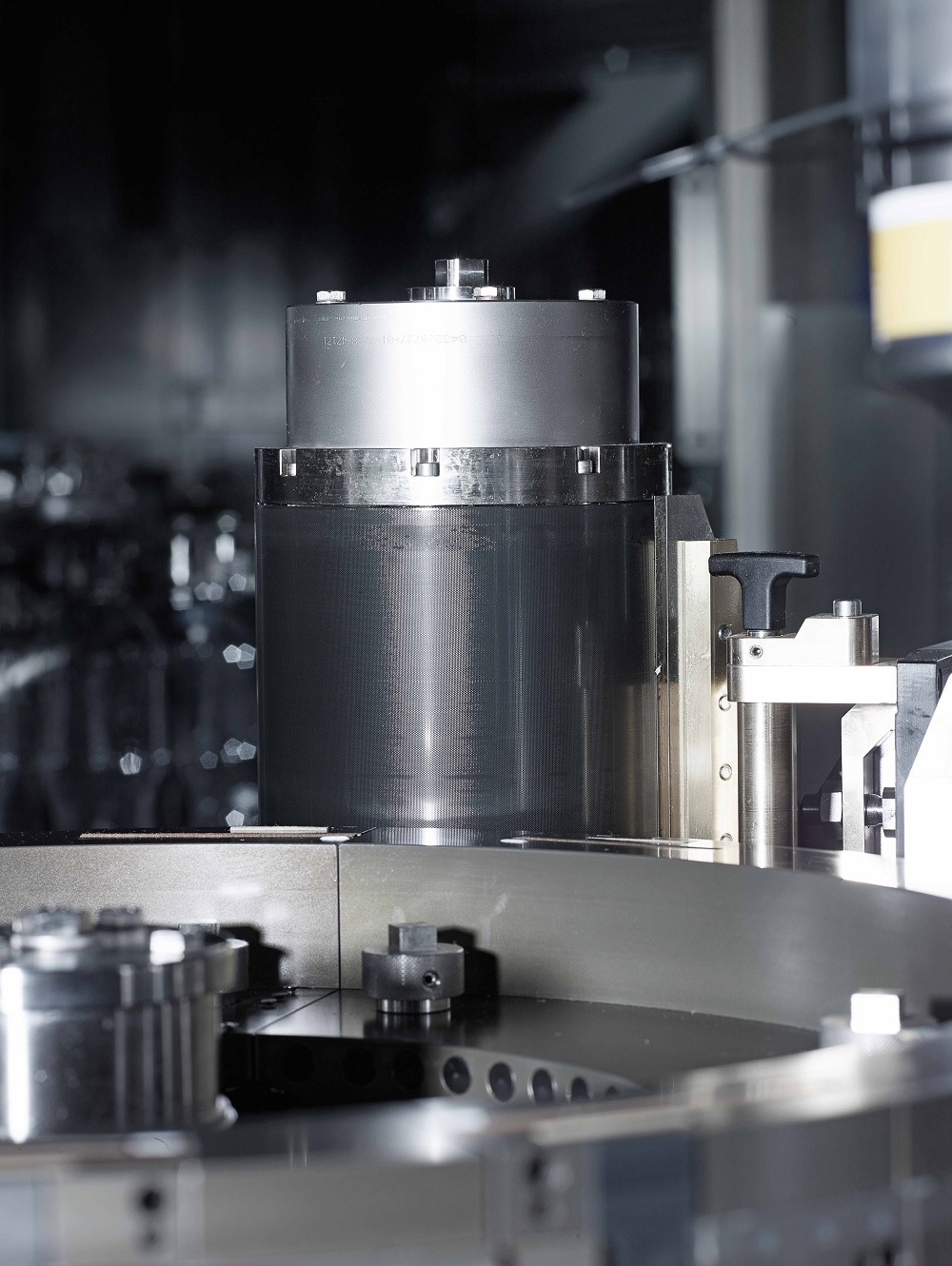
Laser-engraved glue roller (a standard scope for the roll-fed machine portfolio)
How does Sidel integrate sustainable solutions in labelling?
Sustainability is always at the heart of Sidel. We make every effort to minimise the impact on the environment.
The Sidel EvoDECO labelling solutions minimise electricity and glue consumption via the new melter and glue distribution control. With an integrated glue tank in the roll-fed labeller, a patented vertical melter and heating control, glue is melted on demand and always circulated at a precise temperature and in smaller quantities, increasing label application quality. This enables reduced glue consumption and prevents glue degradation, glue filaments, and glue splashing, for better overall quality and improved sustainability. The solution offers 40% less electricity consumption and needs no gears and transmissions and therefore no lubrication.
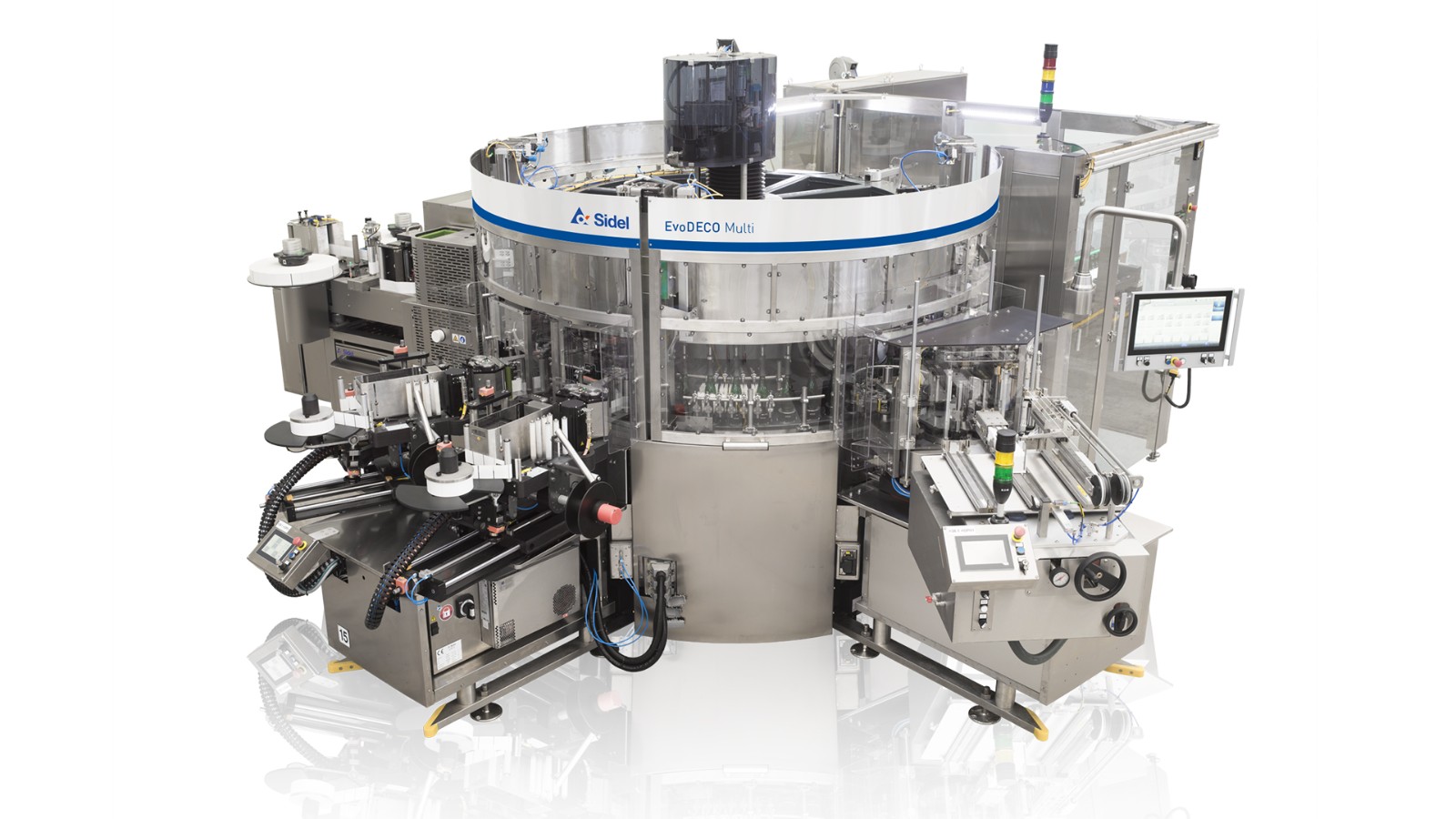
Sidel EvoDECO Multi
About lightweighting, how has the move towards lighter bottles affected labelling?
Packaging design has a critical impact on the efficiency of the entire supply chain. Over the past 30 years, we have more than halved the weight of a 1.5-L PET bottle, while increasing output speeds by 2.5 times, with considerable savings in terms of raw material and gains from a productivity perspective. Therefore, it is a story about “rightweighting” – making sure that the package is minimised while still maintaining its technical performance and high consumer appeal.
Some manufacturers use nitrogen to add resistance and stability to the bottle. Sidel has designed its labellers so that they can manage the extra demands of bottle lightweighting with or even without nitrogen.
The most advanced solution for handling lightweight bottles is the Super Combi, where the labeller is placed in between the blower and the filler as part of an all-in-one solution. With this setting, labels are applied on the empty bottles handled by the neck, reducing the risk of scratches and improving overall bottle quality.
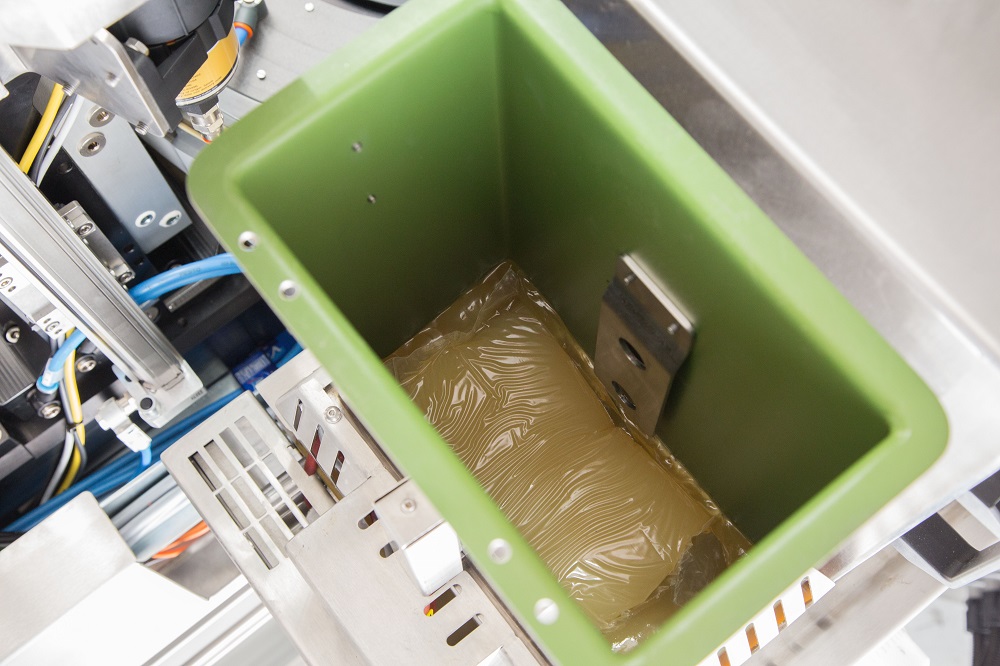
With an integrated glue tank in the roll-fed labeller, a patented vertical melter and heating control, glue is melted on demand and always circulated at a precise temperature and in smaller quantities, increasing label application quality.
Another crucial factor in labelling is flexibility, and this relates to product personalisation. What is it, and how does it affect labels?
Labels are key components of any brand marketing mix, allowing manufacturers to differentiate their products and give end consumers the information they need and increasingly expect. The growing variety of beverage types and bottle formats has made labelling increasingly challenging. More than ever, flexibility has become a valuable benefit to beverage producers. Top priorities today are faster product and format changeovers, simple operations and optimised processes that use the same equipment for different label types, while still ensuring consistent uptime.
Product personalisation is about being able to produce smaller batches of products with their own labelling in a very short time. Hence, the main challenges are the short timeframe for creating customised graphics and labels. Personalising the label is a difficult process, as there are so many different elements involved. The change usually starts with marketing and then has to go through design and production phases and lastly storage and transport. In fact, the standard process for a label change can easily take over four months.
With the rise of online shopping, there has been a challenge to supply consistent, unique and durable packaging and label solutions. This has opened new opportunities to offer personalised packaging solutions for product protection during shipping, by rightsizing the packaging and making sure that it provides a seamless brand experience for consumers.
This is the reason why we also provide consultancy for customers regarding packaging design. We not only create bottle designs but also labels or secondary packaging, etc. Sidel’s packaging experts are ready to support our customers in figuring out the best option that fits the company’s brand identity and responds best to consumer preference.
How does Sidel react and help customers face this challenge?
We fully understand the challenge, and that is why we have flexibility in mind. With Sidel’s EvoDECO labelling solutions, manufacturers can deliver different stock keeping units (SKUs). They might either include several labelling applications in one multi-technology machine or a single labelling application through dedicated equipment for optimised uptime, reduced footprint and low total cost of ownership (TCO).
So manufacturers can use one machine for different labels?
Exactly. It gives businesses the flexibility they need and allows them to produce most product types on a single machine. Thanks to the modular design and a variety of technologies, they allow companies to adapt multiple application methods in one compact machine.
What is the most up-to-date Sidel labelling solution with high flexibility?
The most flexible labelling solution to date from Sidel, the EvoDECO Multi, brings next-level modularity into labelling. It offers a standardised carousel that can be equipped with up to four different labelling technologies, including hot melt, roll-fed, self-adhesive and cold glue. Moreover, switching between various labelling modules is quick and easy thanks to Plug & Play connections, offering producers the freedom of labelling choice and total flexibility. Meanwhile, when being part of Sidel’s Super Combi settings, the labeller can run at up to 90,000 bottles per hour (bph).
What are your observations on the impact of the pandemic on the labelling industry?
During the pandemic, many people reduced their daily spending due to economic reasons. This has resulted in stagnating sales for certain premium products in the beverage sector, and manufacturers have been forced to reduce packaging costs. For instance, the second-tier beverage producers have shown significant interest in converting from shrink sleeves to BOPP labels to save cost. That is the reason why low-cost beverages have been popping up recently in the market.
Lastly, would you share with us what milestones Sidel has achieved and Sidel’s next step in labelling?
Since 1976, Sidel has continuously ensured and promoted the image of various brands. That is 45 years of experience. At its dedicated labelling plant in Mantua, Italy, the company is not only manufacturing labelling equipment, but also providing outstanding services to support its customers worldwide. Additionally, we are proud of the milestone we achieved in 2021 – installing the 5,000th labeller for Ting Hsin International Group (Ting Hsin) in China.
We aim to play as an end-to-end partner in sustainable labelling, starting from offering packaging design to providing the proper equipment for advanced product manufacturing, including high-tech solutions for product shelf-life security.














